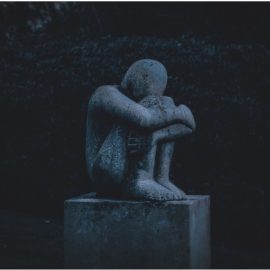

This article is an excerpt from the Shortform book guide to "Meditations" by Marcus Aurelius. Shortform has the world's best summaries and analyses of books you should be reading.
Like this article? Sign up for a free trial here .
What does Stoicism have to say about death? Is there a Stoic way to face death?
Stoics see death not as something to brush under the carpet, but rather as a reality to confront and make peace with. Stoic philosophers even kept a human skull on their desk as a reminder of mortality.
Here’s what Marcus Aurelius, a Roman emperor and a distinguished Stoic philosopher, had to stay on Stoicism and death.
Stoicism and Death
Perhaps you admire the great heroes and emperors of the past. However, you must ask yourself: Where are those people now? The answer is that they’re nowhere—they’re gone, long since changed into something else by nature and time. This is the relationship between Stoicism and death.
Even the greatest human life is insignificant; it blows away like smoke on the wind. Knowing that, why should you worry about life and death? To live your short life righteously, in accordance with nature and logos, is enough.
Remember: You’re a mortal being, and your destruction—or rather, transformation—is unavoidable. If that transformation caused any harm to the parts of the world (such as people), it would cause harm to the world itself; it would be like a machine grinding its gears. It would be impossible for nature and the world to run smoothly under such circumstances. Therefore, death must not be harmful.
Furthermore, the gods would not have created such a fine world, yet overlooked the fact that people—even those whom the gods love most—would disappear forever upon death. Therefore, either there is something beyond death, or there’s a good reason why you’ll cease to exist. Either thought should be comforting.
A side note: People ask what evidence there is that the gods exist when nobody has ever seen them. However, the whole world is evidence. You experience the gods’ work every moment of every day, just like you experience your own consciousness—you’ve never seen your mind either, but you know it exists.
Facing Death the Stoic Way
To take a different approach to facing death, ask yourself what it is about life that you’re so desperate to cling to. Breathing? Feeling? Speaking? You don’t need those things, and the fear of losing them is an obstacle to following logos.
It might also make death easier to face if you recognize that, no matter how good and righteous you’ve been in life, at least a few people will be happy to see you go. When you recognize that you’ll be making others’ lives easier by dying, you’ll be less reluctant to do so.
If the fear of death creeps in, look at whatever you’re doing at the moment and ask: Am I afraid because I won’t be able to do this thing anymore? By repeatedly examining what you think you’re afraid of, you’ll realize that there’s nothing to fear.
Take a Bow
As a closing thought, theater has a lot to teach about how to live and how to die:
- Tragic plays exist to remind you of what can and will eventually happen to you. If you enjoy watching tragic events in the theatre, they shouldn’t upset you when they happen in real life.
- After Tragedy came Old Comedy, which taught equally valuable lessons in a different way—by speaking plainly, with a simple honesty that cuts through pretenses and false beliefs.
- Following Old Comedy came Middle and New Comedy. These forms only strive for technique; they have no messages behind them. The shows might be enjoyable, but what’s the point of them? No one should seek to live like that—pleasantly but without purpose.
Finally, like the curtain coming down at the end of a play, death will eventually come for each of us. Actors don’t get to choose how long a play is; the playwright made that decision long before they ever stepped on stage.
Therefore, like an actor bows and leaves the stage at her appointed time, leave this world with humility and grace—the same grace that you received all throughout your life.
Don’t Fear Death
You should live with the knowledge that you’ll eventually die and use that knowledge to stay focused on your work. However, that doesn’t mean that you should fear death.
Death is a natural and necessary process, and there’s no reason for a rational person to be afraid of it. You can be sure of this because the gods have given you the intelligence, skills, and tools that you need to avoid harm; therefore, if death were harmful, they would have given you a way to avoid it.
Furthermore, the gods and nature don’t act randomly, letting good and bad things happen to good and bad people respectively. However, everyone experiences life and death—along with pleasure and pain, and success and failure—so you must conclude that these things are neither good nor bad. They simply exist. If death isn’t bad, then there’s no reason to be afraid of it.
Nobody knows what happens after death, but there’s no reason to fear that, either. If you go on to another life, then that place must surely have gods as well. They won’t allow any harm to come to you. If, however, there’s nothing after death, then it means you’ll be free of pleasures and pains; free of the concerns of your failing body. Neither possibility should scare you.
Let Go of Longevity
As you contemplate the prospect of death, remember that there’s no intrinsic benefit to living a longer life. All that a person ever has is the present moment, and that moment is all that’s lost upon death.
If I were to live 50 years and you were to live 5,000 years, our lives would amount to the same thing: collections of moments that fade to nothing once they’re past. Therefore, worrying about how long your body will be able to contain your spirit, or exactly when you’ll die, is a waste of time and energy.
Furthermore, as you age, you may find that your faculties start slipping away. The older you get, the more likely you are to lose your reason and logic. Without a healthy mind, you can’t properly determine what your duties are and how to make the most of your time. In other words, you can lose your ability to live well, even before you stop living. This is another reason why longevity isn’t a boon.
In short, in each moment you should decide to do what’s best for you, while you still can. By doing so, you’ll make the most of whatever life you have, and won’t be concerned about the length of that life.
Recognize What’s Best for You
What’s best for you is what benefits you, personally. As we said before, what benefits you most is probably logos. Living by logos and philosophy is what sets a good person apart from others.
Someone who calmly welcomes whatever fate brings, who clearly sees and understands each situation as it arises, and who lives simply, humbly, and cheerfully, is someone who lives a good life. When the end of that life comes, the person faces it with acceptance and serenity. Nothing could be more beneficial than that.
Finally, any action that hurts others doesn’t benefit you—we’re all connected through nature, so harming others will harm you as well. Thoughts that drive you to mean-spiritedness, hypocrisy, or deception are similarly damaging, because they affect your character.
Face Life and Death With Philosophy
Practicing philosophy is the key to living a simple, focused, and fulfilling life. Philosophy allows you to keep your soul pure, unaffected by good or bad times. It also ensures your integrity and keeps you honest.
Like a doctor keeps his instruments ready in case of emergencies, you should keep your philosophy ready to analyze and understand whatever situations arise in your life. Remember that you need to clearly understand something before you respond to it.
Keep in mind that spiritual practices (like philosophy) and physical practices are connected. You shouldn’t take any actions that aren’t in line with your philosophy—however, philosophy is useless if you don’t act on it. Neither type of practice should exist without the other.
Finally, when the time comes, philosophy will let you face death cheerfully. Dying is just one more situation that you must analyze with philosophy and respond to accordingly.

———End of Preview———
Like what you just read? Read the rest of the world's best book summary and analysis of Marcus Aurelius's "Meditations" at Shortform .
Here's what you'll find in our full Meditations summary :
- Marcus Aurelius' teachings on Stoicism
- How rational thinking can guide you through any hardship and allow you to endure any pain
- Why you should be motivated by death rather than afraid of it






